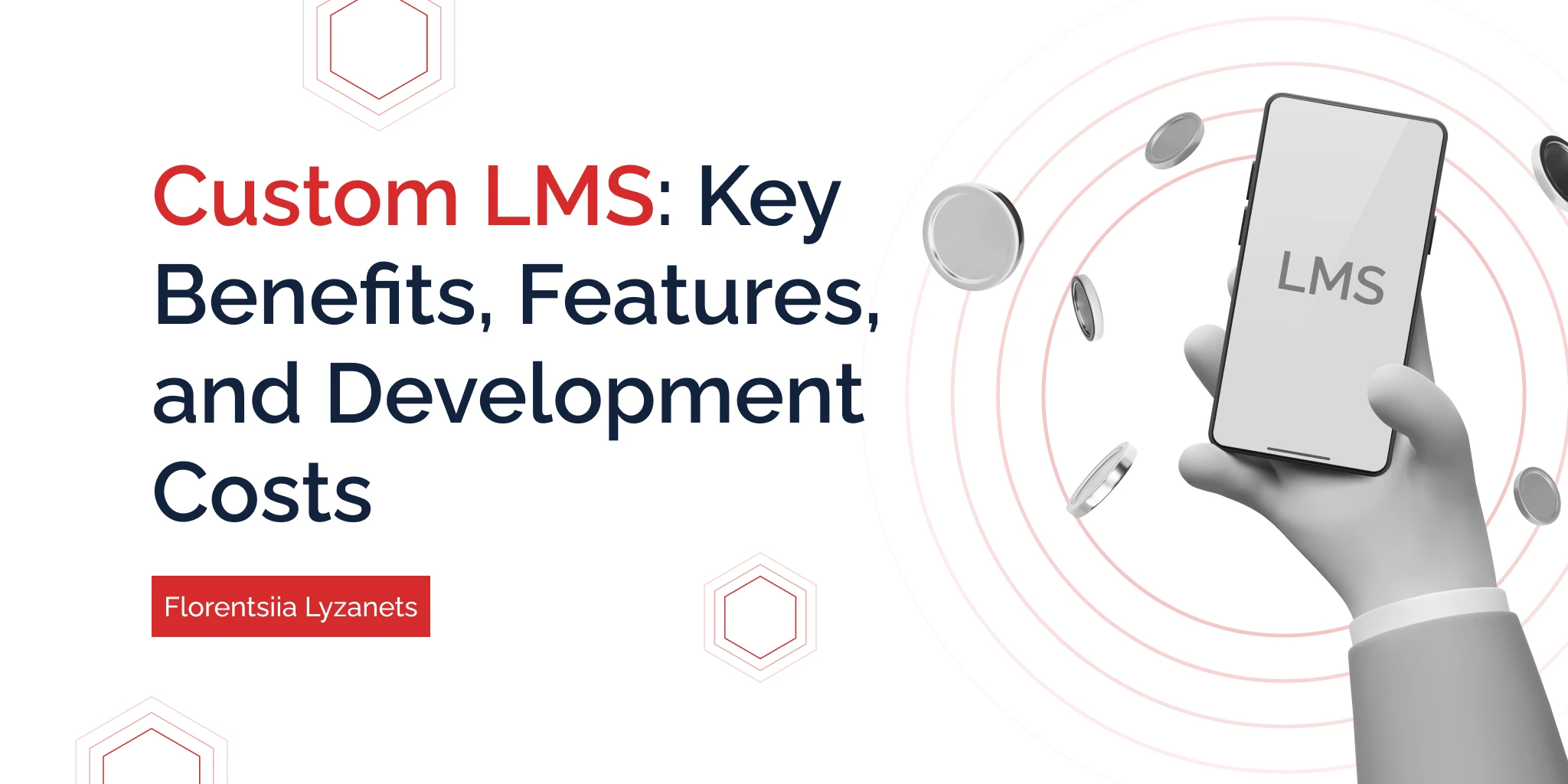Educators and institutions could be more resilient and prepared if they had a custom LMS.
So, in this article, I would like to look at the definition of LMS and the practical learning management system benefits its essential features offer. Let’s start with the basics: what is a learning management system, and what are the top reasons to build a customizable LMS?
What Is a Custom Learning Management System?
A learning management system is a software tool allowing you to efficiently administer, document, track, and report learning and development programs. Using LMS, you can easily automate all processes and deliver all updates on time to the learners, creating a seamless learning experience.
Today, it’s challenging to imagine education without a learning management system. It’s additional help in all cases and for all users (including corporate training). But what is it? How to build your own LMS from scratch, use an existing one, or integrate it with your software product? Let’s discuss and analyze.
It doesn’t matter where you study; there are fundamental, but let’s say, monotonous daily processes we should regularly manage and track. For instance, checking the student’s presence in class or monitoring the course completion progress requires at least some effort and time. What if we can spend this time on a more critical task as teaching and generating new educational ideas? The solution comes in the form of custom software development. Covid-19 is less topical today, but online education that was streamlined by the pandemic is streaming and growing in the market many times. Accordingly, knowing about custom LMS development and the features of an effective system is essential.
LMS is the system allowing you to organize the teaching and learning process from scratch and monitor everything you once had to track manually. You can track learners’ engagement, performance, and progress through online courses and virtual classes at any time and location.
Top 5 Reasons: Why Should You Build a Custom Learning Management System?
Even if education in your business isn’t a priority, there come times when you need to consider this aspect. To get your business constantly improved, the goals like retaining your employees, helping reveal their potential, determining talents, and monitoring the performance of your staff are always critical.
LMS is a tool enabling you to simplify the onboarding process and maintain continual learning of your personnel. It also tracks the external operations of your organization. With the learning management system, you can ensure your customers will be satisfied with your products.
However, you should note that even a specific LMS with basic features won’t necessarily cover all your company’s needs. Creating e-learning content, organizing it into virtual courses, managing learners, and tracking their progress aren’t enough to maintain efficacy in collaboration with managers, staff, and customers. What about avoiding unwanted functionalities and using the desired features? What about customer support, delivery of quality, and integration with third-party solutions? All this you can achieve by building your custom learning management product.
If you didn’t develop or work with a learning management system, you could probably view it as an expensive, technologically complicated, and barely helpful platform. You may know little about its features, benefits, and prospects if you think so.
We’ve listed five reasons why you should employ custom LMS software development. The advantages include improved business performance, flexibility, centralization, time- and cost-efficiency, and LMS customization.
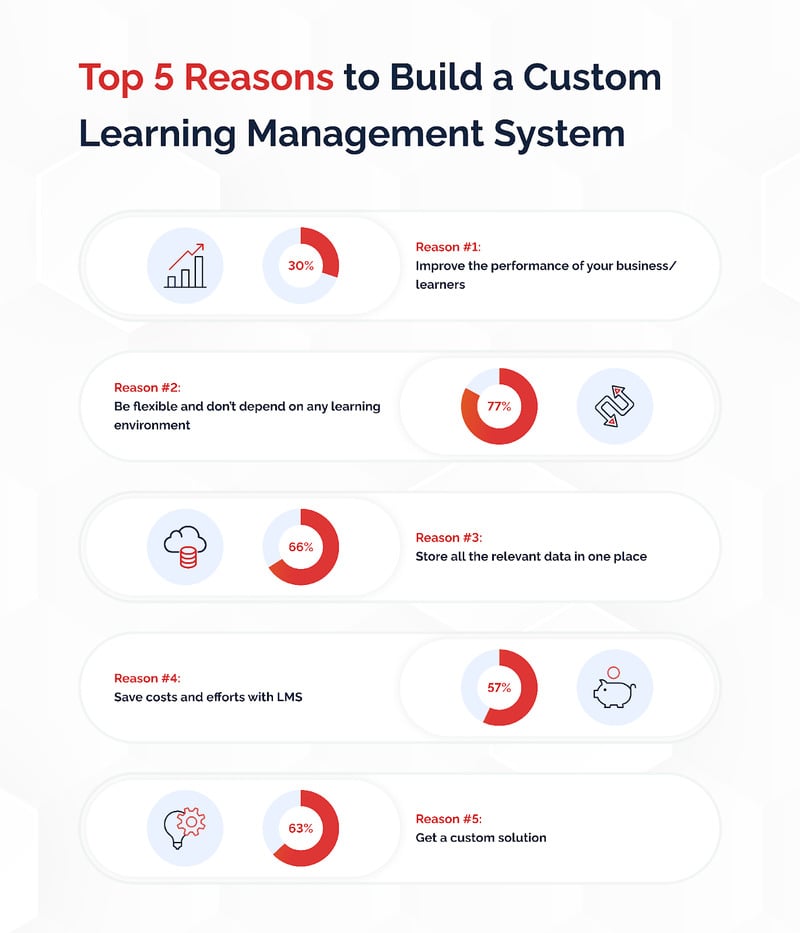
Reason #1: Improve the Performance of Your Business/Learners
Implementing custom LMS is a perfect shortcut to improving the performance of your business or educational institution.
Any business is defined partly by the people working there. The reason is that their performance translates directly into the company’s progress.
According to Topyx,
Your employees and their training are integral to your business. Hiring top talent can result in a 10 percent increase in productivity, a 20 percent increase in sales, a 30 percent increase in profitability, and a 25 percent decrease in unscheduled absences.
You can employ custom LMS software development to educate employees on recent operational or technological changes. For example, if you install an expensive modern device, you might not want inexperienced employees to come straight to work with it. You would instead train them via a virtual LMS first. A custom LMS can also improve the soft skills of your personnel like communication, conflict solving, or decision-making.
Similarly, LMS promises to boost the learning performance of your students. It makes the learning process more personalized, engaging, and flexible — it’s easier for users to maintain focus if they decide on their schedule. Also, LMS grants an opportunity to use various multimedia files and tools, diversifying learning and making theoretical studies more exciting.
By developing LMS, you can track your employees’ performance. This way, you can see who is working hard, deserving encouragement, and falling behind, requiring help. It can also serve as an essential tool for the challenge system fostering employees’ personal and professional development.
Reason #2: Be Flexible and Don’t Depend on any Learning Environment
A custom learning management system development is a perfect opportunity to leave the premises of an office or a traditional classroom and nonetheless maintain an efficient approach to educational material. When having all the information in the virtual environment, people can access it or pass a training course at home, in a café, on the road, in the park, or on sick leave. It’s beneficial for the students and employees of the new generation, who don’t want to work from 10 am to 6 pm five days a week from the office. The modern generation strives for flexibility, creativity, communication, and total freedom in terms of time and location, while studying is a perfect way to keep them motivated and engaged through elements such as gamification features.
According to a study conducted by Potomac University,
77% of educators believe online learning is just as good as traditional learning, if not better. Also, nearly 70% of all students claim online instruction to be as good as or better than in a conventional classroom setting due to its scope of features.
Similar flexibility can be not just a benefit but a necessity — as the situation with COVID-19 proved. Schools and companies prepared to move their processes online won over their competitors that didn’t have a full-scale software solution. After all, the coronavirus left almost no time to think or to get ready — everyone had to act fast, and learning management systems became a salvation for the training and education sector.
Reason #3: Store All the Relevant Data in One Place
You can employ a custom learning management system to centralize data storage. At first sight, data centralization seems not to offer any practical value.
However, there are four significant benefits of using LMS for data centralization:
People get faster answers.
Nowadays, most people don’t fancy going to the library or looking through numerous papers. The modern generation wants all the answers here and now, and a custom LMS satisfies similar demand.
Data is secure, and access is regulated.
You can store all the training materials, company policies, job guidelines, documents, or personal notes in one place. Your custom LMS should allow you to manage access rights to use it better. LMS lets the learners access the needed information with a single click without worrying they can see something they aren’t supposed to.
Learners are provided with equal knowledge opportunities.
Regardless of the physical location of your employees, all of them have relevant and up-to-date information. This way, LMS helps ensure compliance with corporate ethical and legal guidelines. It’s the way the learning management system turns into a centralized knowledge hub.
You can analyze and adjust knowledge base efficiency.
A thorough knowledge base will enable you to determine which books, courses, and other learning resources are most and least well-liked by students. It’ll allow you to modify your teaching methods so that your students find the process more engaging.
Reason #4: Save Costs and Efforts with LMS
Efficiency is one of the benefits of LMS. With LMS, you can save a great deal of time, effort, and money. While developing a similar system is expensive and time-consuming, it’s a one-time expenditure paying you off in the future.
Having an LMS minimizes your time and resources on training employees or teaching students. Employee training in its traditional understanding is quite expensive as it requires a coach to be hired, additional materials to be developed, and some working time to be spent. Instead, a learning management system allows you to conduct employee training without other expenses.
According to eLearning Industry,
With LMS, the organization saves on trainers, venue, printing, equipment, travel, logistics, and most importantly, save on time.
Reason #5: Get a Custom Solution
However, the main reason to choose a custom LMS over a ready-made solution is that custom development allows you to get a product tailored specifically for your interests and needs. Here, the benefits of custom software are obvious: you, as the owner and primary user of the future LMS, should decide what functions to or not to implement and what the optimal interface should look like. Also, the online learning platform is a perfect opportunity to brand your company or educational institution. Ensure your interface and learning materials follow your unique style guide, feature corporate logos, and use corporate colors. Your learners and employees will undoubtedly enjoy your one-of-a-kind style.
Making sure all your tools and products comply with the overall corporate strategy can be more critical than it seems with modern technology.
According to Trissa Strategy Consulting,
63% of successful companies have all their business units aligned to their overall corporate strategy.
Suppose you don’t have sufficient tech expertise in the field. In that case, you can always hire a team of professional software developers, including designers, engineers, testers, and a PM, to manage the project. Specialists knowing how to build a learning management system would conduct a discovery stage to help you better understand your users’ needs and test the idea before bringing it to life. As a result, you’ll have a software product you know everything about, letting you do whatever you need and want it to look like. A software development company wouldn’t only create a product but also make it easy to change with the help of new tools.
Benefits of a Сustom LMS
Complete control over features
Different courses are taught in various formats, and multiple employees learn through different learning paths. Custom LMS instead opens new opportunities in teaching and learning, offering the ability to create powerful courses with numerous functionalities.
Cost-effectiveness
Building a customizable LMS is cheaper than the regular use of its existing analogs. Monthly or yearly subscriptions increased constantly depending on users’ amount, storage space, and functionalities. A custom LMS allows businesses to create a learning platform with all the needed features for the business training requirements. Specialists from Keenethics have vast knowledge of developing software products based on clients’ needs. We can save you much time determining the LMS system and learning how to set it yourself. We deliver unique and custom solutions with agreed deadlines and costs. Moreover, we’re ready to help you develop additional features after the main cycle of development is complete.
Quality and reliability
Custom LMS can be a unique product thanks to the best practices Keenethics delivers. You can rely on us in every aspect, including rigorous testing, user interface creation, quality of service, and warranty. We ensure developing LMS by Keenethics is future-proof and client-oriented.
Usability
Even if the users aren’t tech-savvy, rely on us. We have a team providing different roles such as UX/UI, consultation, producing ideas, learning journey conceptualization, and product delivery. We listen to your vision and implement tailored solutions focused on a custom design with an intuitive interface, advanced search, and other features.
Compatibility
The Learning Management System (LMS) is supported by Google Chrome and Mozilla Firefox and runs with PC and Mac devices.
Key Features of Custom LMS
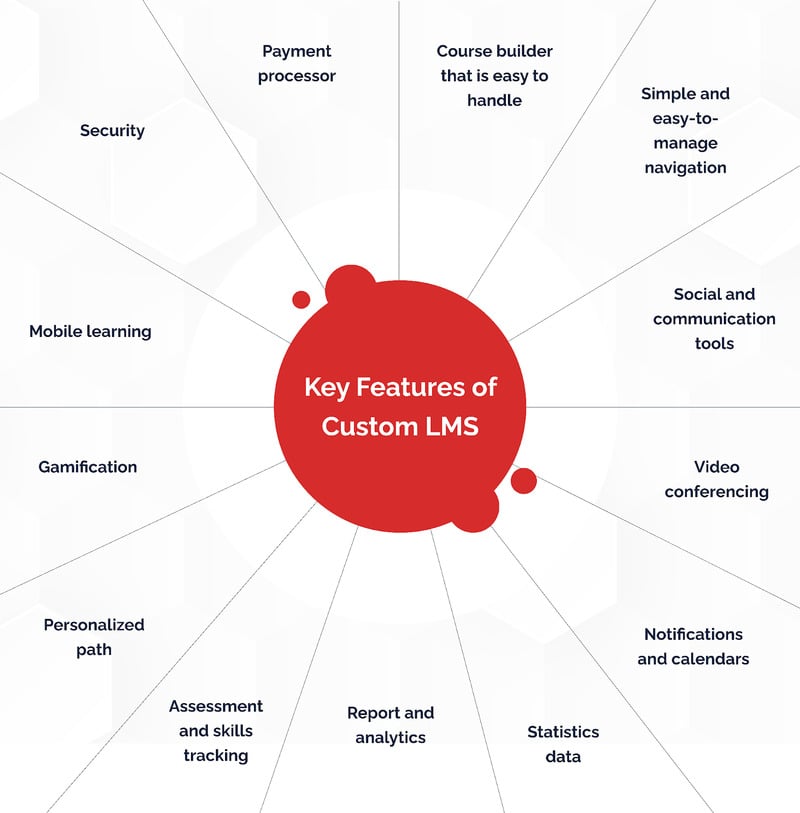
Based on Keenethics’ experience, we can list the features of the learning management system. They can enhance the educational processes in your business and increase the ROI. If you plan to build your own LMS, considering some features may help you meet the user’s needs.
Course builder that is easy to handle
To increase the user base of your LMS, you need to take care of the intuitive and straightforward course builder of the system. It’s always beneficial when everything is simple in navigation, creation, editing, and development. Using your customizable LMS, the users should have the chance to easily manage their courses, including creating, editing, and sharing them. The opportunity to add diverse content is also preferable.
Simple and easy-to-manage navigation
Simple navigation is a must-have feature. The reason is apparent – your product will suffer directly if the navigation isn’t intuitive. The primary need is to minimize the waste of users’ time. They should be able to quickly search through the entire course, navigate through pages and topics, and get whatever they want in a few minutes.
Social and communication tools
Adding a similar feature can resemble the users of your LMS as a social media space but for learning purposes. Forums, emails, and chat discussions can break the barrier between educators and learners. This feature integration allows overcoming everything without fear, stress, and limit of access. Let learners connect to other learners or experts and see quick improvements in their skills and knowledge.
Video conferencing
A similar feature is a way of virtual interaction between instructor and learner. Integrating it into your LMS can help you boost course sales.
Notifications and calendars
You can integrate these features to let students see any updates from the instructor on time. Notifications help learners not to miss a task, and calendars simplify the time management of the employees.
Statistics data
Are you interested in getting a more personalized approach towards learners and getting stats to all your questions? Building a sophisticated quiz manager can create quizzes with at least 14 diverse types of questions. The answers can significantly help the admins and users improve teaching based on learners’ preferences.
Report and analytics
Control of progress and course efficiency depends on the above feature. You can track the time learners spent on the learning, the learning barriers inside the course, and general stats of the whole class and each learner. Analytics offered by a development service provider lets you see what interests them and even what they search and learn outside the LMS.
Assessment and skills tracking
Assessment helps track performance and avoid possible compliance violations, reducing the cost of development. As an alternative, you can build a certification course based on the evaluation of your employees. It’ll raise the learners’ motivation to be engaged in learning more to get a certification after passing the course.
Personalized path
Training employees is more complex than training students. Why? Because you can’t manage their time investment as rigorously. So what should you do? Right – set the learning hours. By devoting specific hours to learning, your employees will be motivated to learn at their personalized pace and from anywhere.
Gamification
In our blog, we’ve repeatedly written about using gamified elements, benefits, risks, and examples and the value of investing in gamification in learning. Combining traditional and online education with interactive features such as a gamification element can significantly increase the learners’ interest. These elements can involve leaderboards, badges, awards, game levels, and more.
Mobile learning
When your system is compatible with various platforms and devices, you can make your LMS well-known to a broader audience by hiring a mobile development team. Responsive design is preferable in mobile learning. If you need assistance, our specialists in UI/UX design can gladly help you.
Security
The above feature is for granted. Any product should be secure
without risks of data leaks and any confidential information. Strong reliable passwords, watermarks on content, and other possible functionality can protect the data with a full warranty.
Payment processor
It relates to the critical feature of any LMS. Consequently, the process should be simple for users.
Examples of Custom LMS Capabilities
See the LMS products developed by Keenethics: SelfLeaders and Let’s Start Coding.
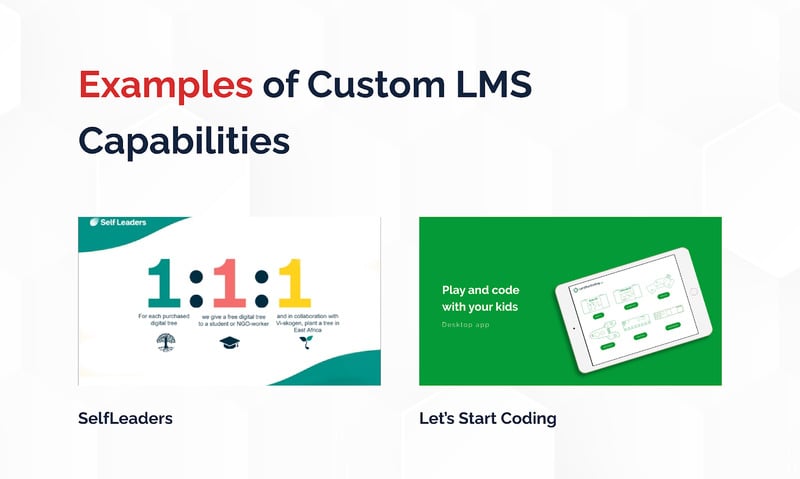
Custom LMS Development Pricing
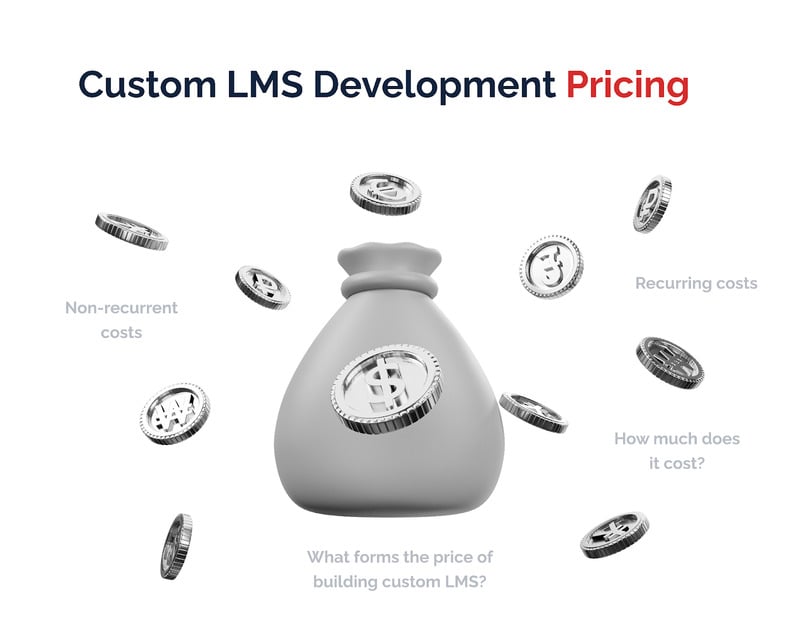
The rise in LMS’s popularity leads to the interest in the pricing model of the system. The development cost depends on the tech stack, scalability, development time, conditions delivered by the provider, and other factors. Another critical feature influencing the price is the deployment type, such as cloud-based LMS, self-hosted, or open-source.
The best way to get the most out of the development cost is to consider various types of LMS pricing. The best pricing decision is to assess the metrics of every model for multiple scenarios, including the size of teams, their profile, and compliance needs.
Before exploring LMS pricing models, let’s look at several models connected directly to choosing a specific system.
Non-recurrent costs
When buying a new LMS, the users should spend non-recurrent costs of setup. It’s an unavoidable cost to let users start with the basics or integration of LMS. As a part of this initial step, many vendors provide basic services like product training and support, white labeling, or tailored branding options. We can’t set the exact cost for ethical reasons since it depends on your preferences, vision, and other detailed information.
However, the approximate cost for non-recurrent costs is:
• 5000 $ for SaaS setups;
• if LMS is client-hosted, the vendors can get near 25 000 $.
It would help if you examined recurring costs since not every LMS requires one-time fees. Instead, they can recoup the price of LMS through recurring or annual charges.
Recurring costs
This type of cost involves a monthly pricing plan. The idea behind the model is “monthly active users.” It means you pay not for all users of your LMS but only for the active ones who’ve used your LMS in a given period. This way, the cost may be fixed or vary due to the popularity of your product.
Other organizations may base their recurring costs not on the users using the LMS but on the tech part of the product. They may spend expenses on servers, continuous maintenance, or other issues the provider carries.
The final price can help you determine if you need to invest in developing a custom LMS but have a limited budget. We can ensure that the development is costly since it requires time and quality specialists to deploy it. But is there a specific price? Let’s see.
The cost involves two questions:
1. What forms the price of building custom LMS?
2. How much does it cost?
What forms the price of building custom LMS?
It’s safe to say no IT company can provide you with the exact price immediately. If they can, it isn’t a custom solution – no way. It’s not about their expertise, no.
The cost depends on complexity, research of your queries, and warranty that a product meets the customers’ requirements. Therefore, only after setting numerous questions to the client can the contractor give you a price estimation.
The aspects influencing the price are unlimited but may include:
• tech stack chosen
• functionalities
• timeframes
• compatibility
• number of platforms you need to cover
Well, how much does it cost?
Whatever LMS may be, we can define the average price based on the market.
While for a web-based LMS, we can offer about 450-500 hours on the MVP development cycle, the mobile version may vary due to a specific platform. The hourly rate of both depends on the location and expertise level of the contractor.
For web custom LMS:
• in Ukraine, the cost is 20-50$
• in the USA, the price is – $80-200
For mobile custom LMS:
• in Ukraine, the cost is $30-100
• in the USA, the price is $50-250
Custom LMS Development with Keenethics
If you’ve decided to employ a custom learning management system development, it’s high time to view its development process.
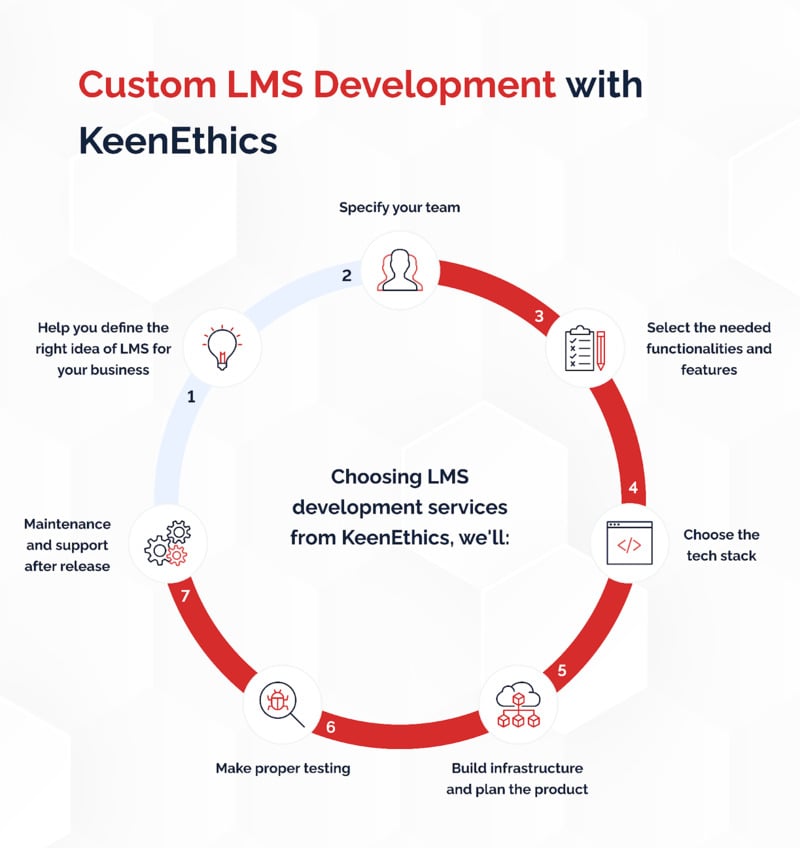
Choosing custom LMS development services from Keenethics, we’ll:
• help you define the right idea of LMS for your business;
• specify your team;
• select the needed functionalities and features;
• choose the tech stack;
• build infrastructure and plan the product;
• make proper testing;
• maintenance and support after release
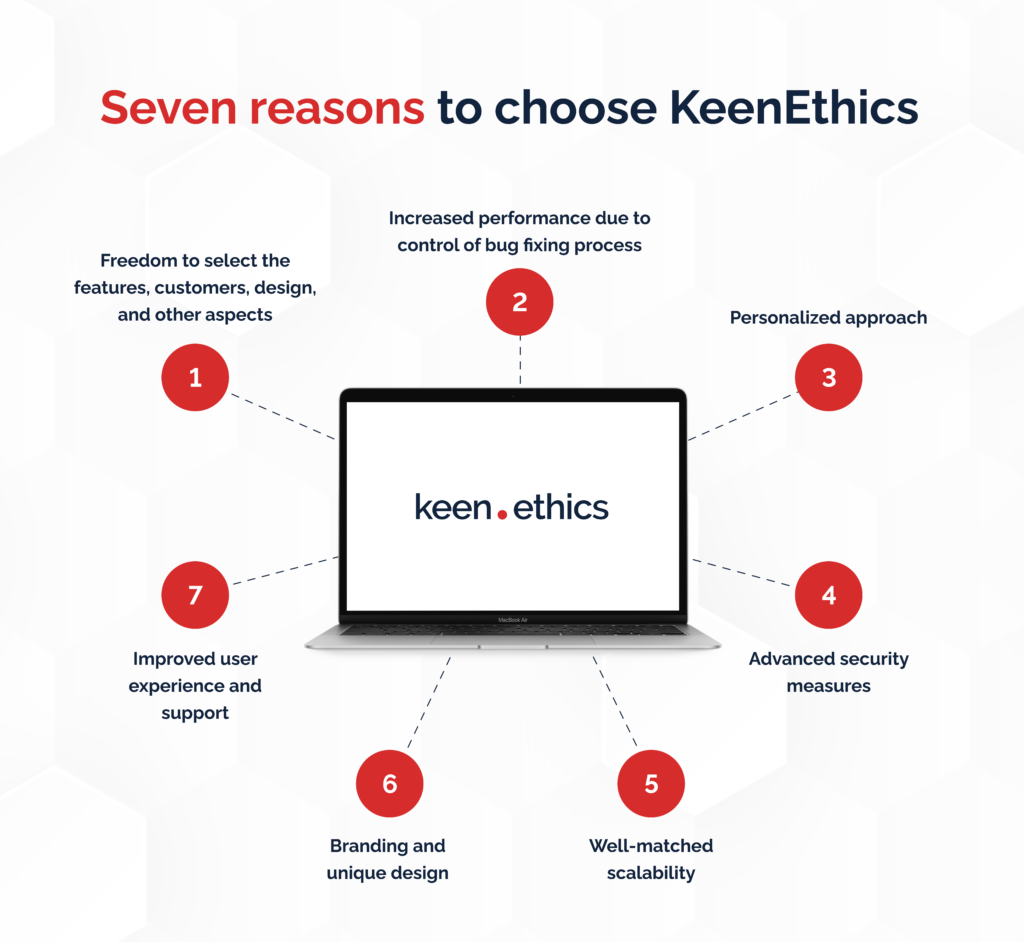
Seven reasons to choose Keenethics:
1. freedom to select the features, customers, design, and other aspects
2. increased performance due to control of bug fixing process
3. personalized approach
4. advanced security measures
5. well-matched scalability
6. branding and unique design
7. improved user experience and support
Keenethics is an award-winning web and mobile development provider offering customized, scalable learning solutions. Address us; we’re ready to bring all your ideas to life. Let’s transform the learning process together, no matter the institution.
In Conclusion
In conclusion, it’s not a great idea to tell the basics, like how much LMS is critical. It is, for sure. But we believe the information above will help you make the right decision. We’re here to listen to you if you have questions about building your own LMS in education or other industries, including healthcare, nonprofit, finance, and banking.
We believe that our assessments are realistic since we have years of experience. We also communicate with decision-makers in diverse spheres and set our predictions and vision based on it. But this is only one of many factors determining our position. We’ve executed 80+ projects, including Bookmaker, a book publishing platform; Ruuster, a revolutionary management system; WorldLbas, an online business incubator; Brainable, a brain-training website, and more. As for LMS, we know how it works and how to make your product customized and profitable. We have a team of dedicated experts to be proud of.
With Keenethics, you’ll be able to weigh all your options, make an informed decision, and create your killer customizable LMS.

